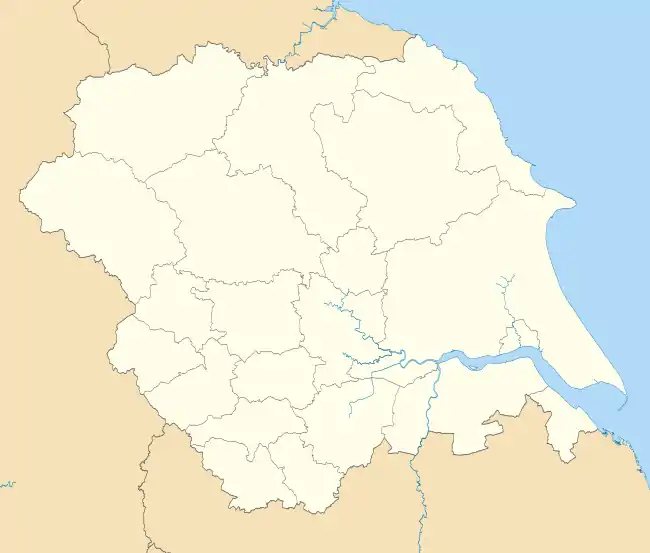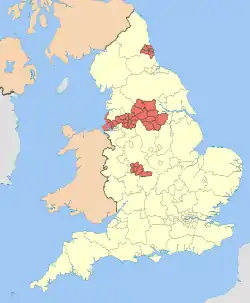Kirklees
Kirklees is a local government district of West Yorkshire, England, governed by Kirklees Council with the status of a metropolitan borough. The largest town and administrative centre of Kirklees is Huddersfield, and the district also includes Batley, Birstall, Cleckheaton, Denby Dale, Dewsbury, Heckmondwike, Holmfirth, Kirkburton, Marsden, Meltham, Mirfield and Slaithwaite. Kirklees had a population of 422,500 in 2011; it is also the third largest metropolitan district in England by area size, behind Doncaster and Leeds.[2]
History
The borough was formed on 1 April 1974 by the provisions of the Local Government Act 1972 as part of a reform of local government in England. Eleven former local government districts were merged: the county boroughs of Huddersfield and Dewsbury, the municipal boroughs of Batley and Spenborough and the urban districts of Colne Valley, Denby Dale, Heckmondwike, Holme Valley, Kirkburton, Meltham and Mirfield.
The name Kirklees was chosen by the merging councils from more than fifty suggestions, including Upper Agbrigg, Brigantia and Wooldale.[3] It was named after Kirklees Priory, which is claimed to be the burial place of Robin Hood , situated midway between Huddersfield and Dewsbury. The priory was located within the present-day Kirklees Park estate, most of which actually lies in the neighbouring borough of Calderdale.[3][4]
Under the original draft of the Act, the district would have included Ossett, part of the Dewsbury Parliamentary constituency at that time. It was eventually decided that Ossett was too remote to be governed from Huddersfield and the town was included within the Wakefield district instead.[5]
Geography
The principal settlements of Kirklees are mill towns in the Colne Valley, Holme Valley, Calder Valley and Spen Valley. Those areas of the district with a more urban character bound Calderdale to the west, Bradford to the northwest, Leeds to the northeast and Wakefield to the east.
The district also includes several rural villages, with the largest rural area extending from the south of Huddersfield. The Pennine countryside to the southwest of Meltham and Holme lies within the Peak District National Park.[6] This moorland area mostly bounds Saddleworth, a traditional part of Yorkshire but now locally governed from Oldham, Greater Manchester. There is then a relatively short border with the High Peak district of Derbyshire running across the summit of Black Hill, and then the main border to the south of Kirklees is with Barnsley.
The inclusion of two county boroughs resulted in a district without an obvious centre. Over the years there have been suggestions of splitting the district into two, administered from Huddersfield and Dewsbury.[7][8] Graham Riddick, as MP for Colne Valley, campaigned for a split in the early 1990s.[9][10] A similar ambition was mentioned by Elizabeth Peacock, MP for Batley and Spen in 1991.[11] The boundaries of metropolitan boroughs were outside the remit of the Banham Commission appointed to review local government structures in 1992 or its successors, and only minor boundary changes were made with neighbouring districts in 1994.[12][13][14]
The district includes parts of three postcode areas. Huddersfield and the rural areas to the south have HD postcodes, Birkenshaw, Cleckheaton and Gomersal have BD postcodes, and the rest of the Heavy Woollen area has WF postcodes. Similarly the district is split between several telephone dialling codes, with most residents in the 01484 (Huddersfield), 01274 (Bradford) and 01924 (Wakefield) codes. A small number of residents in Birchencliffe and Birkenshaw villages fall within the 01422 (Halifax) and 0113 (Leeds) codes respectively.
Demography
Ethnicity
In the 2011 census, the largest ethnic group in Kirklees was White British at 76.7%. The next largest groups were Pakistanis, who comprised 9.9% of the population, and Indians (4.9%).[15]
Religion
The stated religion of the population of Kirklees, as recorded at the 2011 census was as follows:[15]
Transport
Public transport information is provided by Metro, as is the case across West Yorkshire.
Rail
Kirklees lies along the core Huddersfield Line of the TransPennine Express network, with services calling at Huddersfield and Dewsbury. Direct Grand Central services to London King's Cross call at Mirfield. Other railway stations in the district on these routes and on the Penistone Line have local Northern services. Some towns in Kirklees have not been served by rail transport since the Beeching cuts.
Bus
Most bus services in the Huddersfield area are operated by Yorkshire Tiger and First, and most bus services in the Heavy Woollen area are operated by Arriva.
Tourism
Tourism in Kirklees is based around the area's countryside and industrial heritage:
- Bagshaw Museum
- Castle Hill
- Colne Valley Museum
- Holmfirth, setting of long-running sitcom Last of the Summer Wine
- Kirklees Light Railway
- Kirklees Way, 72 miles (116 km) circular walking route
- Marsden Moor Estate
- Oakwell Hall
- Standedge Tunnels and Visitor Centre
- Tolson Museum
Kirklees Council closed Dewsbury Museum and Red House Museum at the end of 2016, claiming it could not afford to continue running them following cuts to its budget.[18]
Tourist information in Kirklees can be obtained from major libraries.[19]
Sport
Huddersfield Town play football in the FL Championship as of the 2020-21 season. They were the first English club to win three successive league titles.
The birthplace of rugby league was at the George Hotel, Huddersfield; local clubs include Super League side Huddersfield Giants, alongside Batley Bulldogs and Dewsbury Rams who both play in the Championship.
Governance
Landmarks from top left to bottom right:
- Huddersfield railway station
- The Bagshaw Museum
- Joseph Priestly statue
- Lion Sweet factory, Cleckheaton
- Dewsbury market place and town hall
- St James' Church, Heckmondwike
- Holmfirth
- St Peter's Church
- Dewsbury Minster
Council
Kirklees Council is the local authority of the district. The council is composed of 69 councillors, three for each of the borough's 23 wards. Elections are held three years out of four, on the first Thursday of May. One third of the councillors are elected, for a four-year term, in each election. The council is currently led by a Labour executive.
Borough status and mayoralty
The shadow Kirklees District Council petitioned the privy council for a royal charter under section 245 of the Local Government Act 1972 granting the status of a borough from 1 April 1974.[20] The grant of borough status entitled the chairman of the council to the title of "mayor", effectively continuing the mayoralties of the former boroughs of Dewsbury (1862), Huddersfield (1898), Batley (1869) and Spenborough (1955).[21] The mayor is elected from among the councillors for a one-year term (the "civic year") at the council's annual meeting.[22]
Kirklees is the most populated borough or district in England not to have city status. In 2001 it was announced that a grant of city status was to be made to an English town to mark the Golden Jubilee of Elizabeth II, and Kirklees council indicated that it was considering applying on behalf of Huddersfield. An unofficial telephone poll by the Huddersfield Examiner found a slim majority against the proposal, and the council did not proceed with the application.[23]
Freedom of the borough
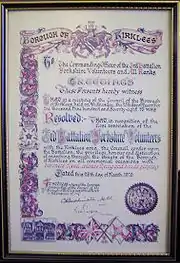

Borough status also allows the council to confer the freedom of the borough on "persons of distinction". Since its formation Kirklees Borough Council has granted this right to two individuals and two groups:
- 3rd Battalion Yorkshire Volunteers - (25 March 1979)[24] On 25 March 1979, Kirklees Metropolitan Borough Council gave the Freedom of Kirklees to the 3rd Battalion of the Yorkshire Volunteers. The 3rd Battalion was at that time the Duke of Wellington's Regiment (West Riding) Territorial Army unit. However the freedom given by Kirklees to the 3rd battalion of the Yorkshire Volunteers did not permit any transfer to heirs or successors and effectively that freedom ceased when the battalion was amalgamated into the East and West Riding Regiment on 1 July 1999. The East and West Riding Regiment ceased to exist on 6 June 2006, having been merged into the Yorkshire Regiment as its 4th Battalion. The Yorkshire Regiment requested the freedom to march to be transferred to them. On 25 October 2008 Kirklees Council transferred the Freedom of Huddersfield to the Yorkshire Regiment at a freedom parade held by the 3rd Battalion, formerly the Duke of Wellington's Regiment (West Riding).
- Sir William Mallalieu MP (27 January 1980)[25]
- The Rt Hon Betty Boothroyd MP (20 November 1992)[25]
- Citizens of Besançon, France (7 October 2005)[25]
- The Yorkshire Regiment (25 October 2008)[26]
Twin towns
Kirklees is twinned with:
 Besançon, France[27]
Besançon, France[27]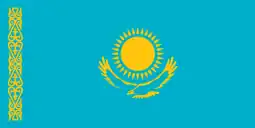 Kostanay, Kazakhstan 1989
Kostanay, Kazakhstan 1989 Bielsko-Biała, Poland 1997
Bielsko-Biała, Poland 1997
Coat of arms
Kirklees Borough Council was granted armorial bearings by the College of Arms by letters patent dated 24 June 1974. the blazon of the arms is as follows:
Vert on a bend Argent a bendlet wavy azure on a chief Or a pale between two cog-wheels azure on the pale a Paschal Lamb supporting a staff of the fourth flying therefrom a forked pennon argent charged with a cross gules; and for a Crest, On a wreath of the colours a ram's head affronty couped argent armed Or gorged with a mural crown sable masoned argent.
Supporters: On either side a lion guardant purpure resting the inner hind leg on a cross crosslet Or embellished in each of the four angles with a fleur de lis azure. Badge or device: A roundel purpure charged with a Lacy Knot Or all within a circle of eleven roses argent barbed and seeded proper.[28]
The green colouring of the shield represents the fields, woods and moorland of the borough. The white stripe or bend represents the M62 motorway, while the blue wave upon it is for the many waterways of the area. On the chief or upper third of the shield is a paschal lamb, symbol of St John the Baptist. John was the patron saint of woolworkers, and the inclusion of the emblem represents the historic woollen industry. The cogwheels are for the modern engineering industries. The crest is a ram's head, found in the arms of the County Borough of Huddersfield and the Mirfield Urban District Council. The black mural crown stands for the district's status as a borough, recalling a city wall. The supporters are purple lions from the arms of the de Laci family, medieval lords of Huddersfield. For heraldic "difference" from other lion supporters a distinctive cross has been placed below their inner feet. This device, combining the symbols of Christ and the Virgin Mary, represents the priory from which the borough took its name.[28][29]
Parish and town councils
In five areas of the borough there is a second tier of local government: the civil parish. Parish or town councils have limited powers of a purely local character, such as owning or maintaining allotments, burial grounds, footpaths and war memorials. Four of the parishes were formed as successor parishes to urban districts abolished in 1974.[30] The fifth was formed in 1988.[31] The five town or parish councils are:
| Council | Area covered | Number of councillors | Parish wards | Formed |
|---|---|---|---|---|
| Denby Dale Parish Council | Denby Dale, Upper and Lower Cumberworth, Upper and Lower Denby, Birdsedge and High Flatts, Scissett, Skelmanthorpe and the hamlet of Kitchenroyd, Emley and Emley Moor and Clayton West[30] | 17[32] | Clayton West, Denby & Cumberworth, Emley, Skelmanthorpe[32] | Successor to Denby Dale UDC 1973[33] |
| Holme Valley Parish Council | Holmfirth and Honley, Brockholes, Cinderhills, Hade Edge, Hepworth, Hinchliffe Mill, Holmbridge, Holme, Jackson Bridge, Netherthong, New Mill, Scholes, Thongsbridge, Upperthong, Wooldale[30] | 23[34] | Brockholes, Fulstone, Hepworth, Holmfirth Central, Honley Central and East, Honley South, Honley West, Netherthong, Scholes, Upper Holme Valley, Upperthong, Wooldale[34] | Successor to Holmfirth UDC 1973,[33] renamed Holme Valley 1975. |
| Kirkburton Parish Council | Farnley Tyas, Flockton, Grange Moor, Highburton, Kirkburton, Kirkheaton, Lepton, Shelley, Shepley and Thurston[30] | 25[35][36] | Flockton, Kirkburton, Kirkheaton, Lepton, Lepton & Whitley Upper, Shelley, Shepley, Thurstonland/Farnley Tyas[35][36] | Successor to Kirkburton UDC 1973[33] |
| Meltham Town Council | Crosland Edge, Meltham, Helme, Wilshaw[30] | 12[37] | None[37] | Successor to Meltham UDC 1973[33] |
| Mirfield Town Council | Battyeford, Mirfield, Northorpe, Lower Hopton and Upper Hopton[30] | 16[31] | Battyeford, Crossley, Eastthorpe, Hopton, Northorpe[31] | Formed 1988[31] |
The remainder of the borough is unparished, with the borough council exercising parish powers.
1997 to date
Since 1997 Kirklees has been divided into five constituencies: four being entirely within the borough, while one ward (Wakefield) is included in the Wakefield Council borough.
The boundaries of two of the Colne Valley and Huddersfield constituencies were virtually unchanged from those defined in 1983. Denby Dale and Kirkburton wards were transferred from Dewsbury to Wakefield, with the former constituency receiving Heckmondwike ward from Batley and Spen.
The constituencies were first used at the 1997 general election, when the Labour Party came to power in a landslide, gaining all the seats in the borough. The party held the seats at the subsequent elections of 2001 and 2005.[38] The incumbent MP for Batley and Spen, Jo Cox, was murdered on 16 June 2016.[39] A constituency by-election took place on 20 October 2016 and Tracy Brabin was elected.[40]
| Constituency | Wards | Member of parliament | Party | Majority | |
|---|---|---|---|---|---|
| Batley and Spen Borough Constituency | 1997–2005: Batley East, Batley West, Birstall and Birkenshaw, Cleckheaton, Spen.[38] 2010–present: |
Tracy Brabin | Labour Co-op | 2017: 8,961 (over Conservatives)[41] | |
| Jo Cox | Labour Party | 2015: 6,057 (over Conservatives)[41] | |||
| Mike Wood | 2010: 4,406 (over Conservatives) | ||||
| 2005: 5,788 (over Conservatives) | |||||
| 2001: 5,064 (over Conservatives)[42] | |||||
| 1997: 6,141 (over Conservatives)[42] | |||||
| Colne Valley County Constituency | Colne Valley West, Crosland Moor, Golcar, Holme Valley North, Holme Valley South, Lindley.[38] |
Thelma Walker | Labour Party | 2017: 915 (over Conservatives)[43] | |
| Jason McCartney | Conservative Party | 2015: 5,378 (over Labour)[43] | |||
| 2010: 4,837 (over Liberal Democrats) | |||||
| Kali Mountford | Labour Party | 2005: 1,501 (over Conservatives) | |||
| 2001: 4,639 (over Conservatives)[44] | |||||
| 1997: 4,840 (over Conservatives)[44] | |||||
| Dewsbury County Constituency | 1997–2005: Dewsbury East, Dewsbury West, Heckmondwike, Mirfield, Thornhill.[38] 2010–present: |
Paula Sherriff | Labour Party | 2017: 3,321 (over Conservatives)[45] | |
| 2015: 1,451 (over Conservatives)[45] | |||||
| Simon Reevell | Conservative Party | 2010: 1,526 (over Labour) | |||
| Shahid Malik | Labour Party | 2005: 4,615 (over Conservatives) | |||
| Ann Taylor | 2001: 8,323 (over Conservatives)[46] | ||||
| 1997: 4,840 (over Conservatives)[46] | |||||
| Huddersfield Borough Constituency | Almondbury, Birkby, Dalton, Deighton, Newsome, Paddock.[38] |
Barry Sheerman | Labour Co-op | 2017: 12,005 (over Conservatives)[47] | |
| 2015: 7,345 (over Conservatives)[47] | |||||
| 2010: 4,472 (over Conservatives) | |||||
| 2005: 8,351 (over Conservatives) | |||||
| 2001: 10,046 (over Conservatives)[48] | |||||
| 1997: 15,848 (over Conservatives)[48] | |||||
| Wakefield County Constituency | 1997–2005: Denby Dale, Kirkburton, Wakefield Central, Wakefield East, Wakefield North, Wakefield Rural.[38] 2010–present: |
Mary Creagh | Labour Party | 2017: 2,176 (over Conservatives)[49] | |
| 2015: 2,613 (over Conservatives)[49] | |||||
| 2010: 1,613 (over Conservatives) | |||||
| 2005: 5,154 (over Conservatives) | |||||
| David Hinchliffe | 2001: 7,954 (over Conservatives)[50] | ||||
| 1997: 14,604 (over Conservatives)[50] | |||||
1983 to 1997
The 1983 general election was the first at which constituencies based on the administrative areas created in 1974 were used. Kirklees was divided into four constituencies.[51] The Conservative Party polled well in the 1983 election, and took two of the borough's constituencies. Labour held Huddersfield, while the Liberals, running in an alliance with the Social Democrats, held Colne Valley. In the following election in 1987 the Labour vote increased slightly, and they gained Dewsbury from the Conservatives. At the same time the Alliance vote fell, and the Conservatives took Colne Valley. The four MPs elected in 1992 were all returned in 1997.
| Constituency | Wards | Member of parliament | Party | Majority | |
|---|---|---|---|---|---|
| Batley and Spen Borough Constituency | Batley East, Batley West, Birstall and Birkenshaw, Cleckheaton, Heckmondwike and Spen[51] |
Elizabeth Peacock | Conservative Party | 1992: 1,408 (over Labour)[52] | |
| 1987: 1,362 (over Labour)[53] | |||||
| 1983: 870 (over Labour)[54] | |||||
| Colne Valley County Constituency | Colne Valley West, Crosland Moor, Golcar, Holme Valley North, Holme Valley South and Lindley.[51] |
Graham Riddick | Conservative Party | 1992: 7,225 (over Labour)[55] | |
| 1987: 1,677 (over Liberal / Alliance)[56] | |||||
| Richard Wainwright | Liberal / Alliance | 1983: 3,146 (over Conservatives)[57] | |||
| Dewsbury County Constituency | Denby Dale, Dewsbury East, Dewsbury West, Kirkburton, Mirfield and Thornhill.[51] |
Ann Taylor | Labour Party | 1992: 634 (over Conservatives))[58] | |
| 1987: 445 (over Conservatives)[59] | |||||
| John Whitfield | Conservative Party | 1983: 2,068 (over Labour)[60] | |||
| Huddersfield Borough Constituency | Almondbury, Birkby, Dalton, Deighton, Newsome and Paddock.[51] |
Barry Sheerman | Labour Party | 1992: 7,258 (over Conservatives)[61] | |
| 1987: 7,278 (over Conservatives)[62] | |||||
| 1983: 3,955 (over Conservatives)[61] | |||||
1974 to 1983
Parliamentary constituencies in England and Wales continued to be defined in terms of the boroughs and districts abolished in 1974 until a general redistribution of seats in 1983. Accordingly, Kirklees was divided between seven constituencies, which had first been used in the 1950 general election.[63]
| Constituency | Former administrative areas | Member of parliament | Party | Majority | |
|---|---|---|---|---|---|
| Batley and Morley Borough Constituency | Municipal Borough of Batley Also included the former Municipal Borough of Morley in the City of Leeds. |
Kenneth Woolmer | Labour Party | 1979: 5,352 (over Conservatives)[64] | |
| Alfred Broughton | October 1974: 8,248 (over Conservatives)[65] | ||||
| February 1974: 7,091 (over Conservatives)[66] | |||||
| Brighouse and Spenborough Borough Constituency | Municipal Borough of Spenborough Also included the former Municipal Borough of Brighouse in the Metropolitan Borough of Calderdale. |
Gary Waller | Conservative Party | 1979: 1,734 (over Labour)[67] | |
| Colin Jackson | Labour Party | October 1974: 2,177 (over Conservatives)[68] | |||
| February 1974: 1,546 (over Conservatives)[69] | |||||
| Colne Valley County Constituency | Colne Valley Urban District, Holmfirth Urban District, Kirkburton Urban District, Meltham Urban District Also included the former Saddleworth Urban District in the Metropolitan Borough of Oldham. |
Richard Wainwright | Liberal Party | 1979: 2,352 (over Labour)[70] | |
| October 1974: 1,666 (over Labour)[71] | |||||
| February 1974: 719 (over Labour)[72] | |||||
| Dewsbury Borough Constituency | Municipal Borough of Dewsbury, Heckmondwike Urban District, Mirfield Urban District Also included the former Municipal Borough of Ossett in the City of Wakefield. |
David Ginsburg | Labour Party (Defected to the |
1979: 4,381 (over Conservatives)[74] | |
| October 1974: 6,901 (over Conservatives)[75] | |||||
| February 1974: 5,412 (over Conservatives)[76] | |||||
| Huddersfield East Borough Constituency | Seven wards of the County Borough of Huddersfield: Almondbury, Dalton, Deighton, Fartown, Newsome, North Central, South Central |
Barry Sheerman | Labour Party | 1979: 3,095 (over Conservatives)[77] | |
| J. P. W. Mallalieu | October 1974: 8,414 (over Conservatives)[78] | ||||
| February 1974: 7,304 (over Conservatives)[79] | |||||
| Huddersfield West Borough Constituency | Eight wards of the County Borough of Huddersfield: Birkby, Crosland Moor, Lindley, Lockwood, Longwood, Marsh, Milnsbridge, Paddock |
Geoffrey Dickens | Conservative Party | 1979: 1,508 (over Labour)[77] | |
| Kenneth Lomas | Labour Party | October 1974: 1,364 (over Conservatives)[78] | |||
| February 1974: 630 (over Conservatives)[79] | |||||
| Penistone County Constituency | Denby Dale Urban District Remainder of constituency consisted of former urban and rural districts in the Metropolitan Borough of Barnsley and the City of Sheffield |
Allen McKay | Labour Party | 1979: 9,701 (over Conservatives)[80] | |
| 1978 by-election: 5,371 (over Conservatives) | |||||
| John Mendelson | October 1974: 1,364 (over Conservatives)[81] | ||||
| February 1974: 630 (over Conservatives)[82] | |||||
See also
References
- "Ethnicity and National Identity in England and Wales 2011". National Statistics Online. Office for National Statistics. Retrieved 29 April 2015.
- Kirklees MBC website - Community statistics, 2011 Census Archived 28 February 2014 at the Wayback Machine
- O'Leary, Patrick (8 August 1974). "Kirklees: Robin Hood brings the communities together". The Times. p. 12.
- "In the footsteps of Robin Hood". History. Channel 4. Retrieved 14 February 2009.
- Ossett Town Hall, Ossett Historical Society, 2008, p. 104.
- "Map of Peak District National Park: Peak District National Park". Peak District National Park. Retrieved 29 June 2017.
- "Dewsbury should split from Kirklees". Huddersfield Daily Examiner. 29 August 2007. Retrieved 29 June 2017.
- "Tories announce plans to split district in two". The Press. Retrieved 29 June 2017.
- https://web.archive.org/web/20070930033504/http://www.parliament.the-stationery-office.co.uk/pa/cm199192/cmhansrd/1992-03-09/Debate-6.html
|archiveurl=missing title (help). Parliamentary Debates (Hansard). House of Commons. 3 March 1992. col. 717. Archived from the original on 30 September 2007. - https://web.archive.org/web/20070930033657/http://www.parliament.the-stationery-office.co.uk/pa/cm199394/cmhansrd/1993-11-22/Debate-8.html
|archiveurl=missing title (help). Parliamentary Debates (Hansard). House of Commons. 22 November 1993. col. 277. Archived from the original on 30 September 2007. - https://publications.parliament.uk/pa/cm199091/cmhansrd/1991-05-08/Orals-1.html
|chapter-url=missing title (help). Parliamentary Debates (Hansard). House of Collomons. 8 May 1991. col. 711. - https://publications.parliament.uk/pa/cm199596/cmhansrd/vo951204/debtext/51204-31.htm
|chapter-url=missing title (help). Parliamentary Debates (Hansard). House of Commons. 4 December 1995. col. 118. - "The Bradford, Kirklees and Leeds (City and Metropolitan Borough Boundaries) Order 1993". Office of Public Sector Information. 1993. Archived from the original on 6 October 2008. Retrieved 14 February 2009.
- "The Calderdale and Kirklees (Metropolitan Borough Boundaries) Order 1993". Office of Public Sector Information. 1993. Archived from the original on 7 September 2008. Retrieved 14 February 2009.
- "Kirklees Factsheets 2018" (PDF). Retrieved 9 December 2019.
- "No bypass in foreseeable future for Flockton village near M1". Huddersfield Daily Examiner. 9 July 2010. Retrieved 30 June 2017.
- "Cycling". www.kirklees.gov.uk. Kirklees Council. September 2016. Retrieved 30 June 2017.CS1 maint: others (link)
- "Dewsbury Museum closes because of 'austerity cuts'". BBC News. 6 November 2016. Retrieved 29 June 2017.
- "Library locations and opening times". Kirklees Council. September 2016. Retrieved 29 June 2017.
- Local government in England and Wales: A Guide to the New System. London: HMSO. 1974. p. 25. ISBN 0-11-750847-0.
- "Former Mayors". Kirklees Council. August 2008. Archived from the original on 27 February 2009. Retrieved 15 February 2009.
- "The Mayor's Role". Kirklees Council. May 2006. Archived from the original on 5 December 2008. Retrieved 15 February 2009.
- "Huddersfield people undecided on city status bid". Huddersfield Examiner. 9 August 2001. Archived from the original on 11 May 2008. Retrieved 14 February 2009.
- "The Dukes and The West Riding". Regimental History. The Duke of Wellington's Regiment (West Riding)Regimental Association. 2009. Archived from the original on 6 February 2009. Retrieved 14 February 2009.
- "Freedom of Kirklees ...for a French town!". Huddersfield Examiner. 1 April 2005. Archived from the original on 22 February 2012. Retrieved 14 February 2009.
- Hirst, Andrew (16 October 2008). "Special Huddersfield parade to honour Yorkshire Regiment". Huddersfield Examiner. Retrieved 14 February 2009.
- "British towns twinned with French towns". Archant Community Media Ltd. Archived from the original on 5 July 2013. Retrieved 11 July 2013.
- "Kirklees Metropolitan Borough Council". Civic Heraldry of England and Wales. Retrieved 14 February 2009.
- Kirklees Borough Guide, c. 1974.
- "Parish and Town Councils". Kirklees Council. January 2006. Archived from the original on 3 March 2009. Retrieved 16 February 2009.
- "About the Council". Mirfield Town Council. 9 February 2009. Archived from the original on 21 February 2009. Retrieved 16 February 2009.
- "The Councillors". Denby Dale Parish Council. 2007. Archived from the original on 25 February 2009. Retrieved 16 February 2009.
- The Local Government (Successor Parishes) (No. 2) Order 1973 (S.I. 1973/1939).
- "Members of the Council". Holme Valley Parish Council. Archived from the original on 6 July 2009. Retrieved 16 February 2009.
- "Kirkburton Parish Council". Kirklees Council. July 2007. Archived from the original on 13 May 2008. Retrieved 16 February 2009.
- "Parish Councillors' Contact Details". Kirkburton Parish Council. 2007. Archived from the original on 5 September 2008. Retrieved 16 February 2009.
- "Your members of the council". Meltham Town Council. 2008. Retrieved 16 February 2009.
- "The Parliamentary Constituencies (England) Order 1995 (S.I. 1995/1626)". Office of Public Sector Information. 1995. Archived from the original on 4 July 2010. Retrieved 16 February 2009.
- "Labour MP Jo Cox dies after being shot and stabbed in her constituency near Leeds". The Daily Telegraph. 16 June 2016. Retrieved 16 June 2016.
- "Batley and Spen by-election: Tracy Brabin victory for 'hope and unity'". BBC News. 21 October 2016. Retrieved 20 November 2016.
- "Batley & Spen parliamentary constituency". BBC News. Retrieved 31 March 2018.
- "Batley & Spen". Political Science Resources. University of Keele. Retrieved 15 February 2009.
- "Colne Valley parliamentary constituency". BBC News. Retrieved 31 March 2018.
- "Colne Valley". Political Science Resources. University of Keele. Retrieved 15 February 2009.
- "Dewsbury parliamentary constituency". BBC News. Retrieved 31 March 2018.
- "Dewsbury". Political Science Resources. University of Keele. Retrieved 15 February 2009.
- "Huddersfield parliamentary constituency". BBC News. Retrieved 31 March 2018.
- "Huddersfield". Political Science Resources. University of Keele. Retrieved 15 February 2009.
- "Wakefield parliamentary constituency". BBC News. Retrieved 31 March 2018.
- "Wakefield". Political Science Resources. University of Keele. Retrieved 15 February 2009.
- The Parliamentary Constituencies (England) Order 1983 (S.I. 1983/417).
- "United Kingdom General Election Results 1992". Political Science Resources. University of Keele. Retrieved 16 February 2009.
- "United Kingdom General Election Results 1987". Political Science Resources. University of Keele. Retrieved 16 February 2009.
- "United Kingdom General Election Results 1983". Political Science Resources. University of Keele. Retrieved 16 February 2009.
- "United Kingdom General Election Results 1992". Political Science Resources. University of Keele. Retrieved 16 February 2009.
- "United Kingdom General Election Results 1987". Political Science Resources. University of Keele. Retrieved 16 February 2009.
- "United Kingdom General Election Results 1983". Political Science Resources. University of Keele. Retrieved 16 February 2009.
- "United Kingdom General Election Results 1992". Political Science Resources. University of Keele. Retrieved 16 February 2009.
- "United Kingdom General Election Results 1987". Political Science Resources. University of Keele. Retrieved 16 February 2009.
- "United Kingdom General Election Results 1983". Political Science Resources. University of Keele. Retrieved 16 February 2009.
- "United Kingdom General Election Results 1983". Political Science Resources. University of Keele. Retrieved 16 February 2009.
- "United Kingdom General Election Results 1987". Political Science Resources. University of Keele. Retrieved 16 February 2009.
- Representation of the People Act 1948, (c.65), Schedule I.
- "United Kingdom General Election Results 1979". Political Science Resources. University of Keele. Retrieved 16 February 2009.
- "United Kingdom General Election Results October 1974". Political Science Resources. University of Keele. Retrieved 16 February 2009.
- "United Kingdom General Election Results February 1974". Political Science Resources. University of Keele. Retrieved 16 February 2009.
- "United Kingdom General Election Results 1979". Political Science Resources. University of Keele. Retrieved 16 February 2009.
- "United Kingdom General Election Results October 1974". Political Science Resources. University of Keele. Retrieved 16 February 2009.
- "United Kingdom General Election Results February 1974". Political Science Resources. University of Keele. Retrieved 16 February 2009.
- "United Kingdom General Election Results 1979". Political Science Resources. University of Keele. Retrieved 16 February 2009.
- "United Kingdom General Election Results October 1974". Political Science Resources. University of Keele. Retrieved 16 February 2009.
- "United Kingdom General Election Results February 1974". Political Science Resources. University of Keele. Retrieved 16 February 2009.
- Crewe, Ivor; King, Anthony (1995). SDP: The Birth, Life and Death of the Social Democratic Party. Oxford: Oxford University Press. p. 109. ISBN 0-19-828050-5.
- "United Kingdom General Election Results 1979". Political Science Resources. University of Keele. Retrieved 16 February 2009.
- "United Kingdom General Election Results October 1974". Political Science Resources. University of Keele. Retrieved 16 February 2009.
- "United Kingdom General Election Results February 1974". Political Science Resources. University of Keele. Retrieved 16 February 2009.
- "United Kingdom General Election Results 1979". Political Science Resources. University of Keele. Retrieved 16 February 2009.
- "United Kingdom General Election Results October 1974". Political Science Resources. University of Keele. Retrieved 16 February 2009.
- "United Kingdom General Election Results February 1974". Political Science Resources. University of Keele. Retrieved 16 February 2009.
- "United Kingdom General Election Results 1979". Political Science Resources. University of Keele. Retrieved 16 February 2009.
- "United Kingdom General Election Results October 1974". Political Science Resources. University of Keele. Retrieved 16 February 2009.
- "United Kingdom General Election Results February 1974". Political Science Resources. University of Keele. Retrieved 16 February 2009.
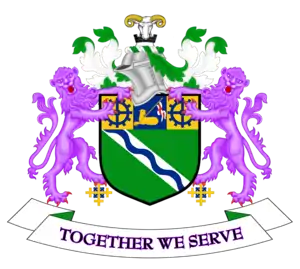
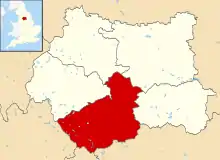
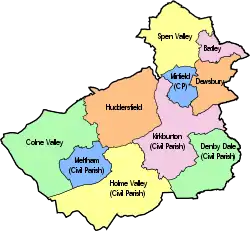
.jpg.webp)
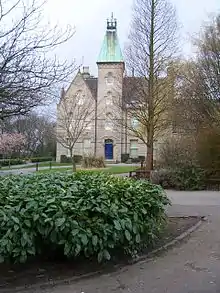
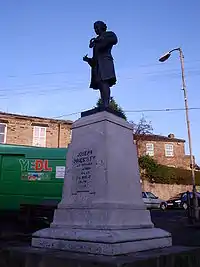
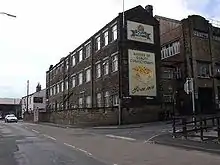

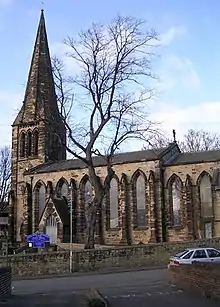
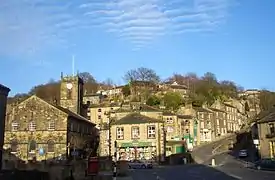
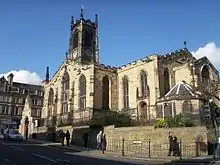
.jpg.webp)
